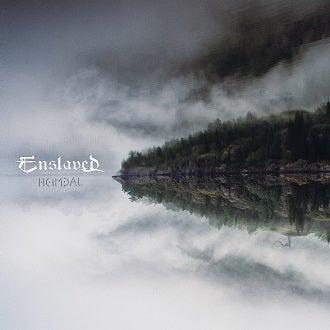
Enslaved
Heimdal
Release:
Tracklist:
- Behind The Mirror
- Congelia
- Forest Dweller
- Kingdom
- The Eternal Sea
- Caravans To The Outer Worlds
- Heimdal
“There was always a moment, sailing between the shore and island, when neither was in sight.” Steve Erickson - Tours Of The Black Clock
In true Enslaved fashion, the Bergen voyagers’ 16th album, Heimdal, is both a departure and a communion with roots forged over three decades ago in the turbulent birth throes of Norway’s black metal scene. Founded in 1991 by the then precociously young Ivar Bjørnson and Grutle Kjellson, Enslaved were determined to set out on a different course from their Satanic, church-burning peers, turning their attention towards Viking lore and writing the majority of the lyrics for their 1994 debut album, Vikingligr Veldi, in Icelandic for its proximity to Old Norse.
If subsequent albums, Frost and Eld – spelling out the dynamic, combinative properties of ice and fire – remain incandescent marker points for Norway’s black metal scene, they were signposts too. Contained within their fevered, sloshing riffs and pomp-infused atmospheres were swells of anticipation and an embryonic sense of destiny. They were tantalising glimpses of the wide-open spaces that have become Enslaved’s guiding principle as they’ve come to straddle the extreme and progressive worlds, with their restless spirit the source of an ongoing journey of wide-eyed discovery.
2020’s Utgard album was the beginning of a new phase for the band, delving deeper into the esoteric nature of Nordic mythology, but finding more precise jump-off points for a leap into the unknown. More streamlined than its multi-layered predecessors, In Times and E, if only to prise open new expanses to explore, its ruminations on the shadowy, titular land of the Norse Jotun ice giants found parallels with the psychological states of the unconscious, and the pilgrimage into our own hearts of darkness that’s the start of the route to all self-knowledge. Of course, even themes of introspection were transformed into kaleidoscopic sonic adventurism, ranging from blackened, frostbitten charges, through lush, billowing, groove-bolstered updrafts to view-above-the-cloudline vistas and even dives into syncopated, krautrock-inspired wormholes.
For Enslaved, each stage of a journey plants a seed for the next. After 2021’s interim EP, Caravans To The Outer Worlds, Heimdal offers another tangential act of discovery, another embarkation point for a solemn, expectant and exhilarating passage through the realms of the senses.
“I had a pretty clear sense of direction with Utgard,” says guitarist and songwriter Ivar Bjørnson. “It really felt like the start of something. It felt like we were taking quite a leap into the next album so that's where the idea for the EP came up, because that's a format you can play around with more. So, there were two main songs, and there were two experimental tracks. But it also worked conceptually, like a launch from one orbit to another. It just felt natural to have that sort of slingshot.”
Heimdal is named after arguably the most mysterious entity in Nordic mythology. Most famously known as the gatekeeper between the nine Norse realms, he’s a source of constant speculation, as scholars continue to offer new interpretations of his origins, and his purpose.
“It’s the weirdest concept,” says Ivar. “I'm not sure entirely what we've done on this album, but I was pulled towards Heimdal mythos from very early on. ‘Heimdallr’ was one of the first songs we ever wrote for Enslaved, and it was an entry point for us into the world of Norse mythology. There are contradictions in who are his parents, and there are wonderful theories that he could be Odin. There's one theory I found particularly interesting, and a lot of the album is based on this, that after the Ragnarok that is coming, he will be the new main god after Odin. And this leads to all kinds of further speculation. So instead of taking a concept and a framework and filling it in, this is more like going down a rabbit hole. We’re chasing all these ideas that we just started with, and are still fascinated by.”
The father/son relationship between the Heimdal and Odin figures mirrors the journey Enslaved have been on for 30 years: the dialogue between older and younger versions of oneself, and whether they are separate, or bound as one. As Ivar says, “It feels like yesterday we were 15 or 18 years old, driving around Haugesund throwing eggs at people during a rehearsal break, and then what the fuck, we have kids? It's sort of a mid-life Ragnarok – not a crisis, but a turning of the corner. Whether it’s the security you now have, or because you’re now dying in a sense more than growing up, that search for uncertainty becomes even more pressing.”
That dialogue between older and younger selves is apparent on Heimdal musically too. As far out as the album reaches, you’ll find homages to Enslaved’s formative influences, from bracing, German thrash riffs to the propulsive backbeat of Led Zeppelin. But they’re the motor for fresh, and often unexpected pastures.
Beginning with the creaking of ropes, the lapping of waves, and the blowing of a horn, ‘Behind The Mirror‘, is a mix of wanderlust and Grutle’s flint-edged prophetic sermons. ‘Congelia‘ rides the crest of the most furious of waves, while ‘Kingdom‘ is a tumbling, psychedelic odyssey with a heart-in-mouth, up-is-down momentum that only labelmates Oranssi Pazuzu could match. But it’s the constant shifting and counterpoints of Heimdal’s overall dynamics that give it such a sense of immersion and wholeness.
“There are so many layers, and there is always something going on,” says Grutle. “That's not something you notice the first time you listen to it, but the albums you have to dig into have always been the most appealing to me, where you have sense of ownership and anticipation with it. That's what we got when we bought albums in the 80s, and those are the feelings we want to bring back.”
If you find yourself not knowing where Heimdal is going to take you next, that is very much the point. The album is bookended by ‘Behind The Mirror‘ and the title track itself, both of which reflect each other conceptually, in terms of being in thrall to their own of transitional states.
“Heimdal is also the god of dawn, and he announces the dawn with his horn,” Ivar explains. “So what you hear on the intro for ‘Behind The Mirror’ is the sound of leaving the land, approaching that dawn that lies behind a bank of fog, and you hear the horn of Heimdal. And you row into that, into the new day where you don’t know what’s behind there.”
“The horn was blown by Eilif Gundersen from Wardruna,” says Grutle, “and it’s super-loud. So you can imagine how that must have sounded when they were using those horns in their ceremonies and for warning of battles. It must have been so frightening, so massive, so divine. It feels like reconnecting to your esoteric, unknown past.”
The latter track is made up of three parts. In the first, Heimdal announces Ragnarok is nigh, and that he’ll meet us on the other side; for the second Ivar asked friends to record a message to their future self as if from the interim between the old world and the new, all of which appear on the track, combined with readings from an ancient text known as the Heimdal spell; and on the third part, Heimdal reappears as the navigator for the human race, leading us to a destiny as yet undefined, which is where the album ends – uncertain, bereft of co-ordinates to orientate by, but full of hope.
“Only fragments remain from the Heimdal spell,” says Grutle. “It’s in ancient Norse, and it refers to his creation that he is the son of the nine sisters of the sea, who represent the nine forms of wave. So that's laying on top of all those voices, going backwards and forwards, and it’s kind of an esoteric passage. It's concluding the whole journey. It’s a portal to the realm of Heimdal, which is like sticking your hand into the void. Hopefully it will come back in one piece.”
“I would say that Heimdal is an album that points towards new beginnings and a dawn that’s on the other side of the apex of the land,” Ivar concludes. “You don’t know what’s on the other side, but you go there. It’s a continuation of the ‘Utgard’ concept. Of course, you have to go into the darkness, that’s all metal and good, but the consequence is that you have to go into the dawn and see what the new day brings.”
Heimdal is reflection of paths travelled, a promise of a new beginning, and a rite of passage between the two. Truly an album for all times.
Enslaved
Musik & Merch
Sichere dir dein Exemplar von Heimdal und vielen weiteren Releases.











